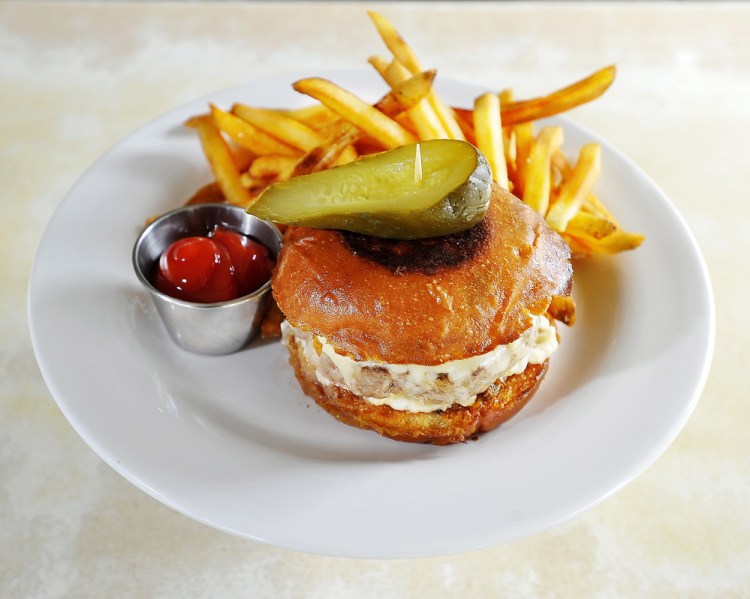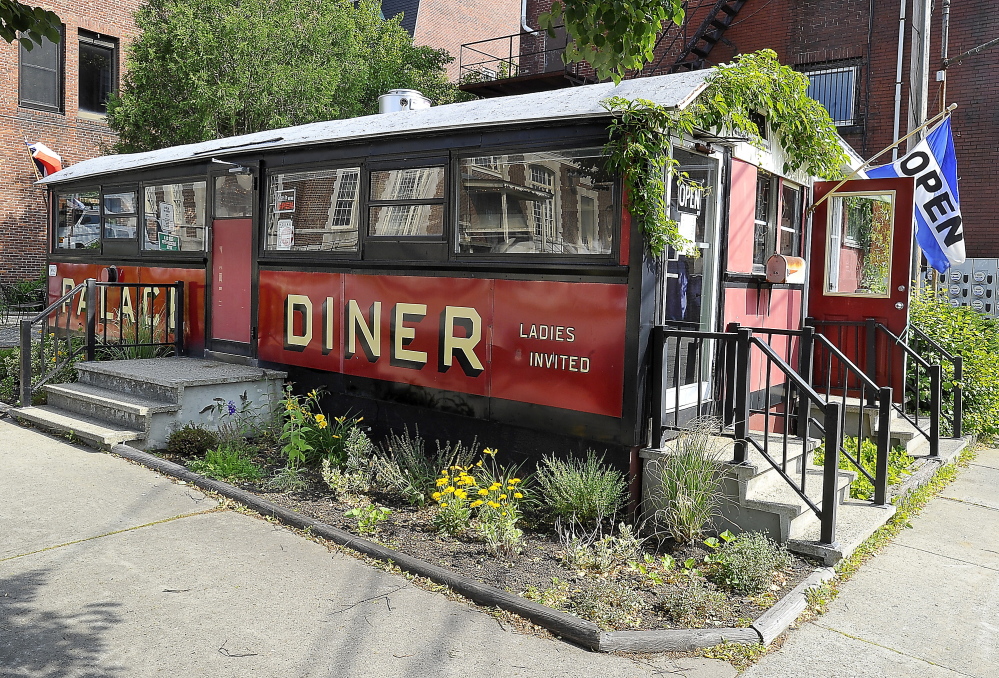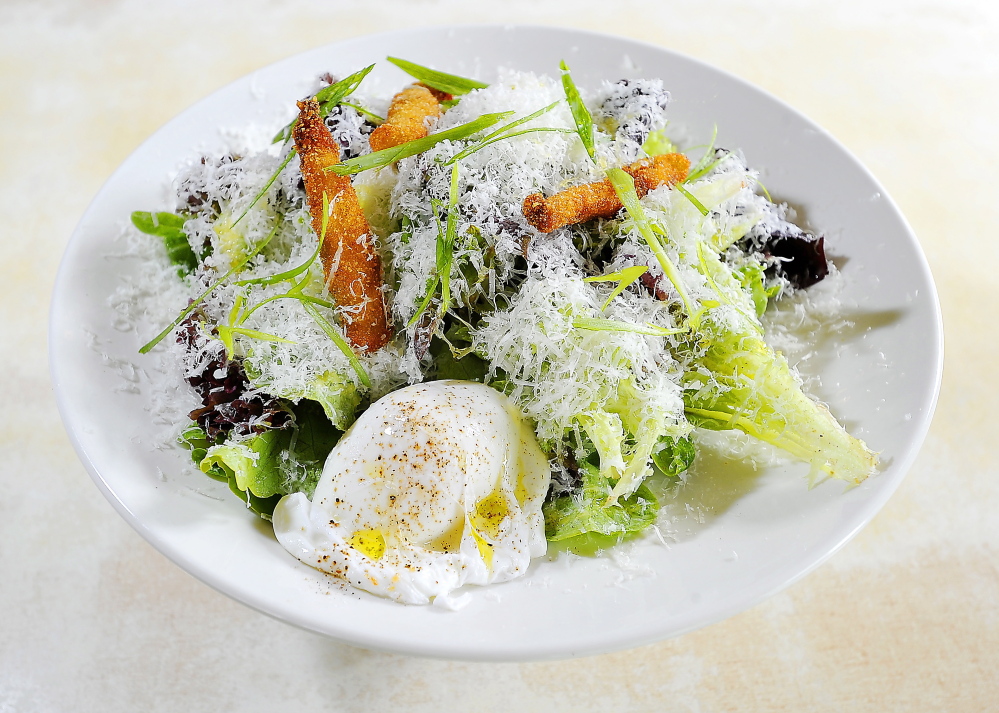We almost don’t find it. The old mill town of Biddeford is a maze of one ways and off angles, but we eventually locate Franklin Street and turn down it, only to end at an abandoned courthouse parking lot, nary a restaurant in sight. I sigh, certain I’ve lost all credibility with my guest in the passenger seat, Kate Christensen, who’s written six novels, won a PEN/Faulkner Award for Fiction, and penned an acclaimed memoir of her life through food – “Blue Plate Special,” the reason for this wild goose chase. We’re headed to the Palace Diner, looking for the Blue Plate Specials of her childhood.
What I’ve gleaned from Kate’s memoir is a) she loves to eat and drink, and b) she’s learned how to do so to celebrate fullness, not fill emptiness. I’m hoping her wisdom might rub off on me, because I’m feeling a little lost, not only here in Biddeford, but – having moved six times in under two years – on my life path.
From the passenger seat, Kate just laughs. It’s an easy, musical, and jubilant sound that immediately puts me at ease, so I turn the car around and suddenly there it is, set into the end of the block facing us – Maine’s oldest diner, a classic Pollard opened in 1927, the size of a train dining car with domed roof and red stripe across the front. It feels like happening on a brightly lit tavern when stranded in a dark wood.
Inside, the walls are shiny and stainless, an orders-up window lends a view to the kitchen beyond, and there’s just room in front for a full-length counter and 15 black vinyl swivel stools. Twenty-something chefs Chad Conley (formerly of Hugo’s and Gather in Maine and Jean-Georges in New York) and Greg Mitchell (Gramercy Tavern and Reynard in New York) are a talented and good-looking team, and – full disclosure – they used to work as apprentices on my dad’s organic farm near Blue Hill, so they greet me with familiarity, making it feel like we’ve just stepped into Cheers.
As more diners arrive, the Palace duo springs into action and the solo waitress, also named Kate, hands us this weekend’s menu (dinner is served on Friday and Saturday nights only). Having read each other’s memoirs, Kate and I can skip the getting-to-know-each-other bit and focus on the food. There are four starters (including the side of fries), three entrées, and one dessert, and we immediately ask for one of each. However, the Parmesan-covered Two Farmers organic lettuce mix with a house green goddess dressing of buttermilk, herbs, lemon, and pureed toasted sunflower seeds ($11) is too delicious to share, so we promptly order another.
“I’m licking my plate,” Kate says, to which our friendly waitress replies, “Yes, we encourage that.”
Kate, I know from my reading, has spent time in France, au-pairing at a Waldorf school, and in Italy, at a Tuscan villa with her partner, screenwriter Brendan Fitzgerald. She asks with authority about the marinated olives ($4) and we learn they’re imported from Castelvetrano, Sicily, and soaked for three days in olive oil, lemon, chilies, thyme and peppercorns. The result is an addictive and surprisingly meaty and filling appetizer.
The local Bangs Island mussels ($17) arrive, served in a broth of butter, garlic, and shallots, and mixed with peperoncini, mint, and scallions, but without the fregola sarda pasta because gluten, Kate says, “makes me puffy and grumpy, two things you really don’t need to experience with me tonight.” We scoop up the liquid with the well-cleaned dark-blue shells and slide the mussels into our mouths the way you eat oysters.
Then comes the burger ($15), yes, without the gluten. While the Southside Bakery brioche bun lends a picturesque display to our neighbors’ plates, the grass-fed beef from Farmers’ Gate, topped with melted cheddar and griddled onion, is just as good, if not better, on its own.
While Kate’s favorite entrée is the burger, I’m finding the griddled brick chicken ($22) deliciously buttery (though cooked in olive oil) and amazingly tender, with a side of equally buttery grits and baby red Russian kale. There’s no such thing as too much butter and olive oil in my book, but I think most would agree the chicken is delicious and satisfying, rather than decadent and overfilling. We finish with a chocolate pudding ($5) that strikes the same balance – light as a mousse, but with a dense chocolate malted flavor, topped by whipped cream.
“This is the kind of place I adore,” Kate summarizes. “It’s the modern Blue Plate Special. They take the original homey staples produced with run-of-the-mill ingredients and slap-dash plating, but use quality ingredients and make it taste and look gourmet and beautiful. Everything is winking at tradition while being fresh and aesthetically on point.”
The Palace also turns out to be the kind of place where all four people I know in Biddeford might show up when I’m there. Two of them live in spitting distance and another, Don Lindgren of Rabelais (a food bookstore relocated from Portland to the nearby mill), arrives with serendipitous timing, just as we’re feeling satiated and chatty over a glass of 2012 Leese Fitch cab ($7) and an Old Fashioned ($9). Once you get Don going, there’s no one in the state who knows more about food and food writing. He also relishes the croquettes ($7), which he says are the perfect snack, the size of a golf ball, breaded and fried with a filling of warm Mornay sauce, ham, jalapenos, and scallions.
“A meal is one thing you do each day that has a beginning, middle and end – something you can complete,” Don says.
Kate agrees. “I love the act of chopping an onion when I’m stuck in a novel. With cooking, at least, I know I’ll soon be eating the results.”
This particular meal ends with Don taking us on a late-night tour of the Rabelais bookstore. I find a favorite book by James Salter, the title of which is also a theme in Kate’s memoir, and of the evening: “Life Is Meals.”
“How can we imagine what our lives should be without the illumination of the lives of others?” Salter further elucidates in his novel, “Light Years.’
I’m reminded by Kate and Don the significance of the fact that just as chopping an onion leads to a feast, so too, breakfast leads to lunch and dinner and back to breakfast again. When we feel lost, it can help to simply follow the schedule of our daily meals until we find our way. If it were nearer my home, I’d happily do so with the help of the clever and devoted chefs at the Palace Diner.
Up Next: From past to present in Kittery with writer and editor Genevieve Morgan.
Melissa Coleman is a Maine writer whose work includes “This Life Is in Your Hands: One Dream, Sixty Acres and a Family Undone,” her memoir about coming of age during the 1970s back-to-the-land movement.
Send questions/comments to the editors.





Comments are no longer available on this story